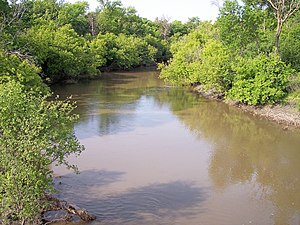Wild Rice River (North Dakota)
| Wild Rice River | |
|
The Wild Rice River near Abercrombie in 2007
|
|
| Country | United States |
|---|---|
| State | North Dakota |
| Source | |
| - location | Brampton Township, Sargent County |
| - elevation | 1,283 ft (391 m) |
| - coordinates | 46°00′56″N 97°47′08″W / 46.01556°N 97.78556°W |
| Mouth | Red River of the North |
| - location | near Frontier, Cass County |
| - elevation | 879 ft (268 m) |
| - coordinates | 46°45′24″N 96°47′24″W / 46.75667°N 96.79000°WCoordinates: 46°45′24″N 96°47′24″W / 46.75667°N 96.79000°W |
| Length | 251 mi (404 km) |
| Basin | 2,233 sq mi (5,783 km2) |
| Discharge | for near Abercrombie |
| - average | 104 cu ft/s (3 m3/s) |
| - max | 9,540 cu ft/s (270 m3/s) |
| - min | 0 cu ft/s (0 m3/s) |
|
The Red River drainage basin, with the Wild Rice Rivers of North Dakota and Minnesota highlighted
|
|
The Wild Rice River is a tributary of the Red River of the North, approximately 251 miles (404 km) long, in southeastern North Dakota in the United States. Via the Red River, Lake Winnipeg, and the Nelson River, it is part of the watershed of Hudson Bay. The Wild Rice River drains an area of 2,233 square miles (5,780 km2) in the Red River Valley region. Its tributaries also drain a small part of northeastern South Dakota. Despite its length, it is a fairly small stream, flowing at an average rate of approximately 100 cubic feet per second (3 m³/s).
The river was so named for the former abundance of wild rice along its course.
The Wild Rice River rises as an intermittent stream in Brampton Township in southeastern Sargent County, approximately 6 miles (10 km) south of Cogswell. It initially flows generally eastwardly in a winding course through Sargent and Richland counties, through the Tewaukon National Wildlife Refuge and past the towns of Cayuga, Mantador and Great Bend. Past Great Bend, the river turns northward; from west of the city of Wahpeton it generally parallels the Red River in a winding channel at a distance of approximately 3 to 7 miles (5 to 11 km). It flows into the Red River in southeastern Cass County, approximately 3 miles (5 km) southeast of Frontier and 7 miles (11 km) south of Fargo.
...
Wikipedia


